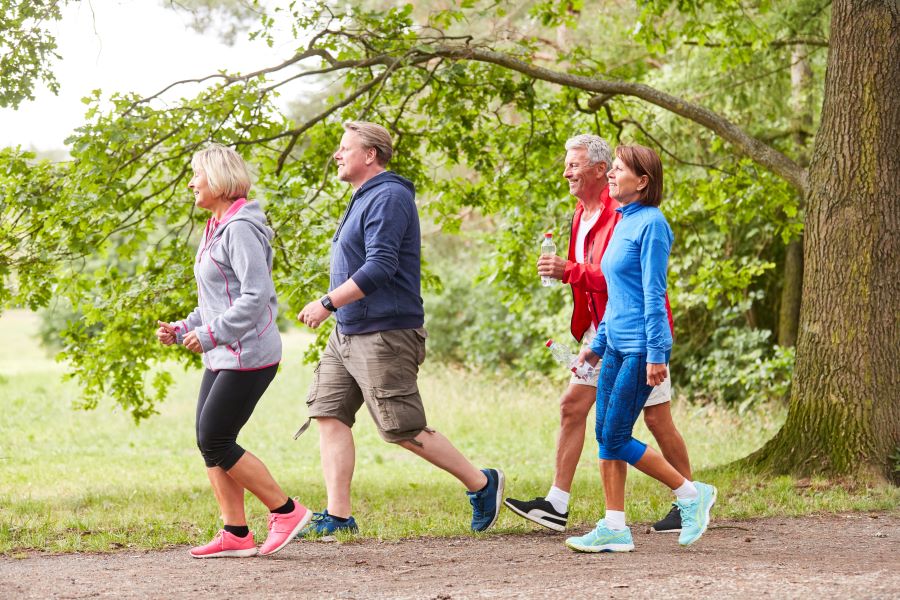Talk of exercise ostensibly leads to a conversation about high-intensity workouts and complex exercise routines. Influencers and experts alike, forget that most of us are mere mortals and find many of the online articles, blogs pictures and videos demotivating. In all the discussion, the simple act of walking tends not just to be overlooked, but also underestimated. Yet, walking is a powerful and accessible form of physical activity which can improve physical health, stimulate our minds and motivate us to achieve our goals. In this article, we explore the underrated power of walking and how it can be a source of both fascination and motivation.
The Science Behind Walking
Walking’s simplicity belies its incredible benefits. Research has shown that regular walking can improve cardiovascular health, lower blood pressure, reduce the risk of chronic diseases, and boost overall physical fitness. But the benefits of walking extend beyond the physical.
There is real science behind the benefits of walking. In September 2021, the Journal of the American Medical Association, published the results of a study, that looked at the linkage between mortality rates and walking. They found that in a cohort of 2,110 middle aged adults walking more than 7,000 steps, mortality rates fell by some 50 to 70%.
What are some of the non-physical benefits of walking?
- Walking encourages the flow of oxygen to the brain, which in turn can improve creativity and mental clarity. A few intellectuals that were said to take long walks include William Wordsworth, Charles Dickens and Aristotle.
- Walking has been shown to reduce stress and anxiety, thanks to the release of endorphins, which are the body’s natural mood lifters. A brisk walk can help clear your mind and promote a sense of calm.
- Walking provides an opportunity to connect with the natural world, whether it’s a stroll through a city park or a hike in the wilderness. Nature has a calming and restorative effect on the mind, fostering a sense of wonder and motivation.
- Walking allows you to reflect and step away from the hustle and bustle of daily life. Whether you’re working through personal problems or setting goals, walking offers a peaceful environment for self-discovery.
- Walking can be a social activity that encourages bonding with friends or family. Engaging in a walking group or taking a leisurely stroll with loved ones can be motivating and enjoyable.
The Motivational Aspects of Walking
- Taking a walk is a wonderful time to set goals and make plans. As you wander, you can visualise your objectives, whether they’re personal, professional, or fitness related. Walking creates a motivational environment to think about your future and take the steps to achieve your goals.
- Walking is about taking one step at a time and steadily moving forward. Demonstrating that achieving even the most ambitious goals is possible when you break them down into manageable steps.
- Committing to a regular walking routine, establishes a sense of accountability. Which can carry over to other aspects of your life, helping you stay motivated and stick to your plans.
- Walking in nature can be a powerful source of inspiration. The beauty of the natural world, from a canal-side walk, to a trapse through a wildflower meadow as the morning mist lifts, can remind you of the wonders that exist beyond your daily routine.
- Walking offers a precious opportunity for self-reflection and self-awareness. Allowing you to align your actions and decisions with your values and aspirations.
Here are seven tips for getting started with walking:
- Start slowly and gradually increase the distance and intensity of your walks over time.
- Wear comfortable shoes and clothing.
- Walk in a safe area where there is little traffic.
- Drink plenty of water before, during, and after your walk.
- Listen to your body and take breaks when you need them.
- If you have any health concerns, be sure to talk to your doctor before starting a new exercise program.
- Take a camera and capture the moment. Now whilst most phones have cameras its great to switch it to silent and make sure your walk is ‘me-time’. Not to be interrupted.
Conclusion
Walking may be an underrated form of physical activity, but it is a source of fascination and motivation waiting to be discovered. The benefits of walking extend far beyond the physical, impacting our mental and emotional well-being and offering a unique opportunity for personal growth and self-discovery. Next time you’re looking for inspiration or motivation, consider taking a walk. You might just find that the path to your goals begins with a simple step.
So, lace up your shoes, step outside, and embark on your journey to motivation with the underrated power of walking.
Useful Links
Walking for health – NHS (www.nhs.uk)
Focus on brisk walking, not just 10,000 steps, say health experts – GOV.UK (www.gov.uk)
Walk your way to health | Walking tips and advice | Age UK
TheBoldAge looks at why you need to change your exercise routine – TheBoldAge
